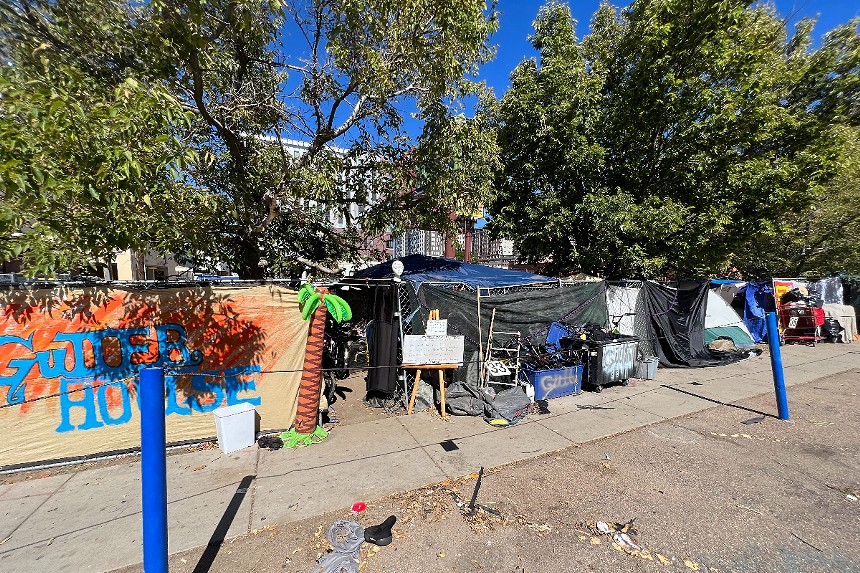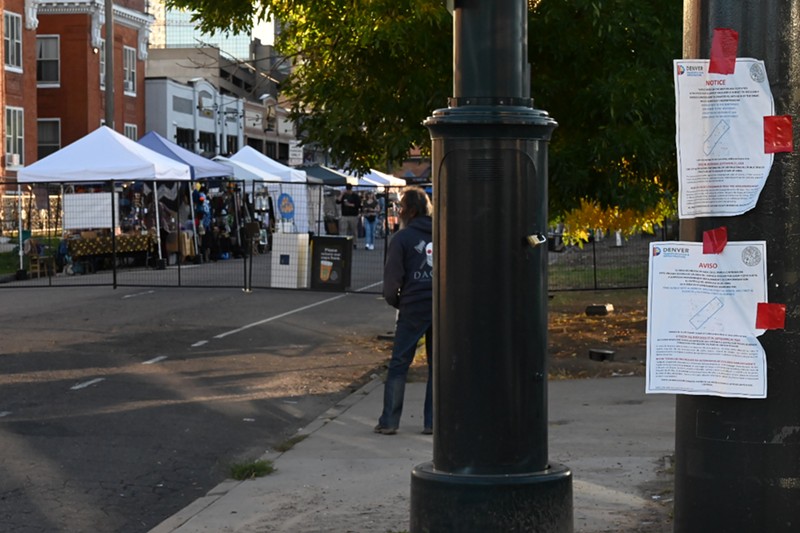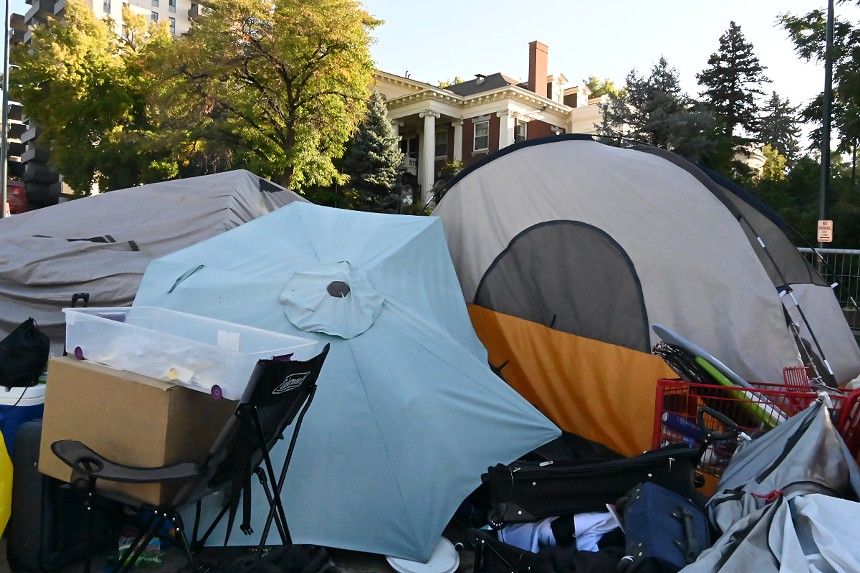Now, Denver's unhoused have learned that Johnston has moved the goalposts, with one more type of sweep his office will continue authorizing that used to be carried out weekly by the Hancock administration — right-of-way sweeps.
When Johnston took office back in July, cleanups such as these stopped immediately stopped after the last one under authorized by Hancock was conducted on July 19. It was ordered seven days earlier, during Hancock's last days in office. Johnston was sworn in on July 17.
On September 26, right-of-way sweeps began again, with at least four taking place since then.
On September 26, right-of-way sweeps began again, with at least four taking place since then.
Johnston has a public goal of taking 1,000 homeless people off the streets of Denver and putting them into transitional housing — mostly converted hotel units or micro-communities like pallet shelters and tiny homes — by 2024.
A right-of-way is a legally established clearing to create a path for the public, such as streets, alleys, sidewalks, trails and even clearings needed for buses, trains, utilities and public infrastructure. Denver residents can get permits to encroach on right-of-ways to make improvements to private property, but it's the job of the Denver Department of Transportation and Infrastructure to ticket and remove any illegal encroachments.
Like the camping ban, enforcing right-of-way encroachments is another way for the city to sweep homeless encampments, which was emphasized by a recently published report from the University of Denver that found the city often doesn't enforce other right-of-way violations, such as those by businesses or homeowners.
Although it's DOTI that orders right-of-way sweeps, Denver mayors can influence how often they're carried out. City records show a stark difference in the number of right-of-way sweeps during the current and previous mayoral administrations.
During Hancock's last six months in office, right-of-way sweeps were done once or twice a week. DOTI carried out at least 42 right-of-way sweeps in 2023, per city records, while Hancock was in office. Denver posted 83 right-of-way cleanups last year and 96 cleanups in 2021.
According to DOTI spokesperson Nancy Kuhn, the City of Denver will enforce right-of-way rules when there are public health and safety risks, as Johnston had noted back in July. But these sweeps don't guarantee housing under Johnston's House1000 plan.
During Hancock's last six months in office, right-of-way sweeps were done once or twice a week. DOTI carried out at least 42 right-of-way sweeps in 2023, per city records, while Hancock was in office. Denver posted 83 right-of-way cleanups last year and 96 cleanups in 2021.
"It is under DOTI's authority to remove encumbrances from the public right-of-way when the city sees an area deteriorating in condition with increasing amounts of trash and other items encumbering and blocking access to the public right-of-way," Kuhn tells Westword. "These cleanup efforts are separate from the House1000 initiative."
Seven days' notice is always given ahead of right-of-way sweeps, Kuhn says, to comply with the Lyall Settlement reached with the feds in 2016. With enforcement of the camping bans, as little as two days' notice has been given.
The city has also been carrying out what DPD officers call "soft sweeps," where police officers show up at encampments to tell homeless residents they're violating the camping ban without issuing tickets.
Multiple agencies are always involved in right-of-way sweeps, according to Kuhn.
"Denver Police assist us," she says, noting how the mayor and other city officials are always aware of the operations before they happen. It ultimately falls on DOTI, Kuhn adds, to post notices warning homeless residents about the encampment cleanups.
The city has also been carrying out what DPD officers call "soft sweeps," where police officers show up at encampments to tell homeless residents they're violating the camping ban without issuing tickets.
Multiple agencies are always involved in right-of-way sweeps, according to Kuhn.
"Denver Police assist us," she says, noting how the mayor and other city officials are always aware of the operations before they happen. It ultimately falls on DOTI, Kuhn adds, to post notices warning homeless residents about the encampment cleanups.
"The mayor's office is aware of any cleanups DOTI posts," she says.
An aide for Denver City Council at-large representative Sarah Parady says that her office is always notified as well, along with the other at-large office and the office of the council district where the sweep is taking place.
When asked if it's the mayor's office who orders these sweeps or if DOTI has to authorize them, Kuhn responds, "Conditions and circumstances dictate the city’s response to encampments. That response has always been a group effort, requiring multi-agency coordination and resources."
Johnston, however, threw a wrench into these response plans this week by calling off two right-of-way sweeps that were ordered by DOTI to happen.
The first was supposed to go down on Tuesday, October 10, at 48th Avenue and Colorado Boulevard. "I didn't think there were pressing public health and safety risks," Johnston tells Westword.
"We're trying to limit those situations," he says. "Our goal is not to need to do large encumbrance cleanups unless we have housing or unless there's public health of safety risk or right-of-way."
Johnston canceled the 48th Avenue and Colorado sweep on October 6, the same day he paid a visit to the encampment.
The other canceled cleanup was a right-of-way sweep scheduled to happen at 50th Avenue and Dahlia Street, which was also supposed to unfold on Tuesday, October 10. The site was due to be swept "under DOTI's authority to remove encumbrances from the public right of way and deteriorating conditions," according to a statement from the Homelessness Resolution Operations Center, a city agency.
The HROC says "there also were significant public health and safety hazards at this site" and "the City and County of Denver decided to address the issues with this encampment in a different way — by providing a portable toilet and trash services as well as additional outreach and service connections."
The agency adds, "As the city moves forward with Mayor Johnston's homelessness initiative and other potential encampment cleanups, we know there will be many opportunities to learn and improve. The new direction with the 50th and Dahlia cleanup was one of those opportunities."
An aide for Denver City Council at-large representative Sarah Parady says that her office is always notified as well, along with the other at-large office and the office of the council district where the sweep is taking place.
When asked if it's the mayor's office who orders these sweeps or if DOTI has to authorize them, Kuhn responds, "Conditions and circumstances dictate the city’s response to encampments. That response has always been a group effort, requiring multi-agency coordination and resources."
Johnston, however, threw a wrench into these response plans this week by calling off two right-of-way sweeps that were ordered by DOTI to happen.
The first was supposed to go down on Tuesday, October 10, at 48th Avenue and Colorado Boulevard. "I didn't think there were pressing public health and safety risks," Johnston tells Westword.
"We're trying to limit those situations," he says. "Our goal is not to need to do large encumbrance cleanups unless we have housing or unless there's public health of safety risk or right-of-way."
Johnston canceled the 48th Avenue and Colorado sweep on October 6, the same day he paid a visit to the encampment.
The other canceled cleanup was a right-of-way sweep scheduled to happen at 50th Avenue and Dahlia Street, which was also supposed to unfold on Tuesday, October 10. The site was due to be swept "under DOTI's authority to remove encumbrances from the public right of way and deteriorating conditions," according to a statement from the Homelessness Resolution Operations Center, a city agency.
The HROC says "there also were significant public health and safety hazards at this site" and "the City and County of Denver decided to address the issues with this encampment in a different way — by providing a portable toilet and trash services as well as additional outreach and service connections."
The agency adds, "As the city moves forward with Mayor Johnston's homelessness initiative and other potential encampment cleanups, we know there will be many opportunities to learn and improve. The new direction with the 50th and Dahlia cleanup was one of those opportunities."
The first sweep under Johnston's administration, on August 4 at 22nd and Stout streets, and his second, on the 1700 block of Logan Street on August 24, were enforcements of the city's camping bans. Both came with 48 hours' notice, as opposed to seven days' notice.
The third sweep, on September 26 at the Governor's Mansion, was the first right-of-way sweep of his administration.
The third sweep, on September 26 at the Governor's Mansion, was the first right-of-way sweep of his administration.
Johnston chose to highlight the Governor's Mansion sweep because it was the first one where displaced homeless residents were given a place to stay after the sweep. Residents were sent to the recently acquired Best Western Central Park hotel on Quebec Street. Johnston housed more than eighty people after that sweep, and he counted those as the first housed under his House1000 plan.
DOTI listed the sweep as a "large-scale (right-of-way) encumbrance cleanup," and since then, DOTI has begun carrying out more right-of-way sweeps, or large-scale encumbrance cleanups, under the Johnston administration.

The "Gutter House" was an encampment that was set up near the 21st and California streets but was swept on September 27 as part of DOTI's right-of-way enforcement.
Courtesy of Scott Coors
Because it's dubbed a "permanently posted cleanup area," Kuhn says, notices are always posted nearby, alerting homeless residents that DOTI may come and clear them out at any time, though a seven-day notice would still be given.
The other two right-of-way sweeps under the Johnston administration happened Tuesday, October 3, and Wednesday, October 4. The first one was at 16th Avenue and Marion Street; the second at 16th Avenue and Sherman Street. Johnston came by to visit on October 3, according to city records.
Asked for the reasoning behind the sweeps, Kuhn says they were done "under DOTI’s authority to remove encumbrances from the public right-of-way. There also were significant public health and safety hazards present."
A propane tank explosion in the encampment on Thursday, September 28, was part of Johnston's reasoning for carrying through with the sweep, though records from DOTI show that a cleanup notice was also posted at 16th Avenue and Marion Street a couple of days before that happened.
"The propane explosion at 16th and Sherman happened after we posted notice of our upcoming cleanup effort," Kuhn confirms. "There were health and safety risks at both encampment locations."
Johnston tells Westword that "we had to just move" the encampment because of the propane tank explosion, but admits that the city knows "that's not the best strategy."
"When feasible, the City and County of Denver will implement a relocation effort," Kuhn says. "However, there unfortunately are still times when public health or public safety risks, or other reasons, require a cleanup even in cases when housing resources are not available."
As for the 16th Avenue sweeps, Kuhn says "the unhoused residents were provided access to resources, including shelter," but "the cleanup efforts were separate from the House1000 initiative." She specifies that congregate shelters are offered when non-congregate shelters, like hotel units, are not available.
"The City and County of Denver will implement a relocation effort to non-congregate — motel or micro-community — options when feasible," Kuhn explains. "However, there unfortunately are still times when public health or public safety risks, or other reasons, require a cleanup even in cases when housing resources are not available, and in these cases, congregate shelter will be offered."
The mayor established a House1000 dashboard a couple of weeks ago to show how many people have been housed through his plan. As of Friday, October 13, the number sat at 168. But the dashboard doesn't specify where those who were housed came from, whether it was an encampment and, if so, which one.













